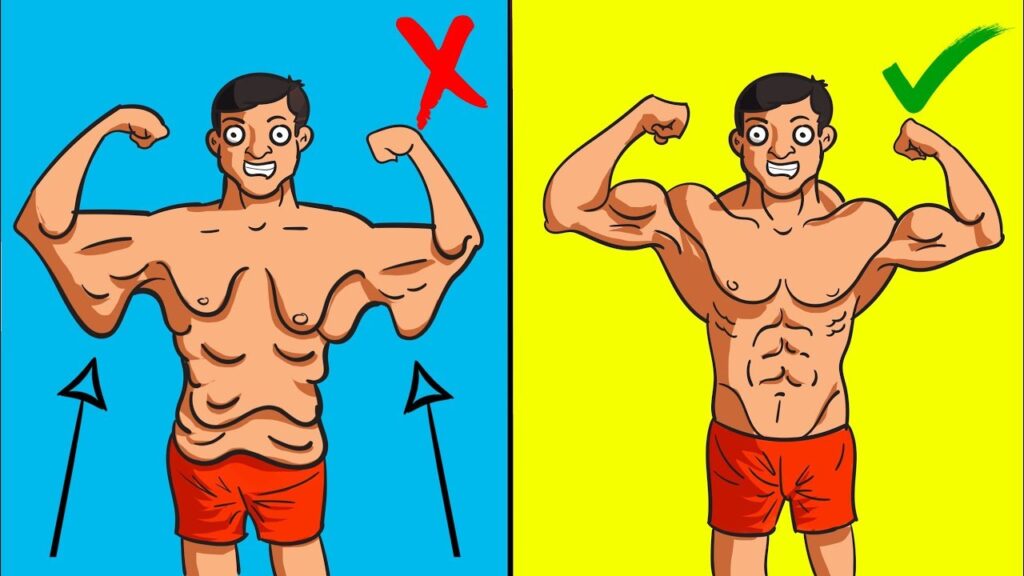Welcome to “The Risks of Losing Fat Too Quickly.” In this article, we will explore the dangers that can arise from trying to shed those extra pounds at a rapid pace, especially for older individuals. While it may be tempting to see quick results, there are potential risks to your health that come with losing fat too quickly. Stay tuned to learn more about the most proven and effective practices and products for safe and sustainable weight loss. Remember, slow and steady wins the race when it comes to achieving a healthier and happier you.
The Risks of Losing Fat Too Quickly
Have you ever wondered what can happen if you try to lose fat too quickly? In this article, we will explore the dangers and risks associated with rapid weight loss. We will discuss why it is important to approach fat loss in a sustainable and healthy way, especially for individuals who are older.

This image is property of i.ytimg.com.
Understanding Rapid Fat Loss
Losing fat quickly is a common goal for many people, especially those who are looking to achieve significant weight loss in a short amount of time. While rapid fat loss may seem appealing, it is important to understand the potential risks and implications that come with it.
When you lose weight quickly, you are often losing more than just fat. Rapid weight loss can result in the loss of muscle mass, electrolyte imbalances, nutrient deficiencies, and metabolic disruptions. These can have serious consequences on your overall health and well-being.
Muscle Loss
One of the biggest risks of losing fat too quickly is muscle loss. When you restrict your calorie intake drastically or engage in extreme exercise routines, your body may start breaking down muscle tissue for energy. This can lead to a decrease in muscle mass, which can negatively impact your metabolism and overall body composition.
Losing muscle mass can also make it harder for you to perform daily activities and exercise. It can result in weakness, fatigue, and a slower metabolism, making it more difficult to maintain weight loss in the long term.
Electrolyte Imbalances
Another potential risk of rapid fat loss is electrolyte imbalances. Electrolytes are essential minerals that help regulate fluid balance, nerve function, and muscle contractions in the body. When you lose weight quickly, especially through extreme methods like fasting or detox diets, you may disrupt the balance of electrolytes in your body.
Electrolyte imbalances can lead to symptoms such as fatigue, muscle cramps, dizziness, and irregular heartbeats. In severe cases, they can even be life-threatening. It is important to ensure that you are consuming an adequate amount of electrolytes through your diet and hydration to support healthy fat loss.
Nutrient Deficiencies
In addition to muscle loss and electrolyte imbalances, rapid fat loss can also result in nutrient deficiencies. When you drastically reduce your calorie intake or eliminate entire food groups from your diet, you may not be getting enough essential nutrients like vitamins, minerals, and antioxidants.
Nutrient deficiencies can weaken your immune system, impair your cognitive function, and disrupt your hormonal balance. They can also lead to hair loss, brittle nails, and dry skin. It is vital to focus on consuming a diverse and balanced diet to support your overall health and well-being while losing fat.
Metabolic Disruptions
Lastly, rapid fat loss can cause metabolic disruptions in your body. When you lose weight too quickly, your body may respond by slowing down your metabolism to conserve energy. This can make it harder for you to continue losing weight and maintain your results in the long term.
Metabolic disruptions can also lead to hormonal imbalances, decreased energy levels, and increased hunger and cravings. Your body may go into “starvation mode” and start storing fat more efficiently to protect against future food shortages. This can create a cycle of weight loss and regain that is difficult to break.
Safer and Sustainable Fat Loss Strategies
While losing fat quickly may seem appealing, it is essential to prioritize safety and sustainability in your weight loss efforts. Here are some strategies to help you achieve fat loss in a healthier and more balanced way, especially if you are older and may have specific health concerns.
Consult with a Healthcare Professional
Before embarking on any weight loss journey, it is crucial to consult with a healthcare professional, such as a doctor or a registered dietitian. They can help you assess your current health status, set realistic goals, and create a personalized plan that aligns with your needs and preferences.
A healthcare professional can also monitor your progress, adjust your plan as needed, and provide support and guidance throughout your fat loss journey. They can help you avoid common pitfalls and ensure that you are losing weight in a safe and sustainable manner.
Focus on Nutrition and Exercise
When it comes to losing fat, a combination of healthy eating and regular exercise is key. Focus on consuming a balanced diet that includes a variety of nutrient-dense foods like fruits, vegetables, whole grains, lean proteins, and healthy fats. This will help you meet your body’s nutritional needs and support your overall health while losing fat.
Incorporate regular physical activity into your routine, such as strength training, cardio, and flexibility exercises. Exercise can help you build and maintain muscle mass, improve your metabolism, and enhance your overall fitness level. Aim to be active most days of the week and find activities that you enjoy and can sustain in the long term.
Set Realistic Goals
Instead of aiming for rapid weight loss, set realistic and achievable goals that focus on sustainable fat loss. Aim to lose about 1-2 pounds per week, which is considered a healthy and safe rate of weight loss. This will help you maintain muscle mass, prevent nutrient deficiencies, and minimize metabolic disruptions.
Focus on making small, gradual changes to your diet and lifestyle that you can maintain over time. Avoid crash diets, fad diets, and extreme exercise regimens that promise quick results but are not sustainable in the long term. Remember that slow and steady progress is more likely to lead to lasting success.
Prioritize Sleep and Stress Management
Sleep and stress play a critical role in weight management and overall health. Make sure you are getting an adequate amount of quality sleep each night, as lack of sleep can disrupt your metabolism, increase cravings, and affect your energy levels. Aim for 7-9 hours of sleep per night to support your fat loss efforts.
Manage your stress levels through relaxation techniques like meditation, deep breathing, yoga, or hobbies that bring you joy. Chronic stress can lead to emotional eating, hormone imbalances, and poor sleep quality, all of which can hinder your weight loss progress. Prioritize self-care and stress management practices to support your overall well-being.
Stay Hydrated and Listen to Your Body
Hydration is essential for fat loss and overall health. Drink an adequate amount of water throughout the day to support digestion, nutrient absorption, and metabolism. Staying hydrated can also help prevent overeating, reduce cravings, and support your body’s natural detoxification processes.
Listen to your body’s hunger and fullness cues to guide your eating habits. Pay attention to when you are truly hungry versus eating out of boredom, stress, or habit. Eat mindfully, savoring each bite, and stop when you are satisfied, not overly full. This can help you maintain a healthy relationship with food and prevent overeating.

This image is property of i0.wp.com.
Conclusion
In conclusion, losing fat too quickly can have serious risks and implications on your health and well-being. It is important to approach fat loss in a safe, sustainable, and balanced way to avoid muscle loss, electrolyte imbalances, nutrient deficiencies, and metabolic disruptions. By focusing on nutrition, exercise, realistic goals, sleep, stress management, hydration, and listening to your body, you can achieve fat loss in a healthier and more successful manner, especially if you are older. Prioritize your health and well-being throughout your fat loss journey, and remember that slow and steady progress is key to long-term success.




